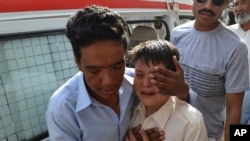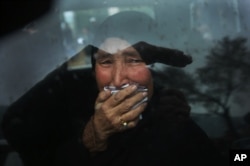Life for Shakar Nisa was good. Her children went to school. There was a lot of food, and they could buy fruit.
One day her husband went to work at his store in Quetta, the capital of Pakistan’s Baluchistan province. He did not return home.
A Sunni extremist had shot and killed him.
Nisa had to find money for herself and her five children. Up until her husband’s death, she had never had a job or worried about money for housing. Her brother-in-law, a poor taxi driver, made her leave the family’s house.
Nisa began working as a housekeeper for $50 dollars a month. The money was just enough to pay for a rental home, electricity and water.
There was no money left for food. Her son left school and started working at a wedding hall, which held parties for the newly married. The son earned $2 a day. Sometimes he brought home leftover food. When he could not, the family ate only bread with tea.
Nisa and her children are members of the small Hazara community in Quetta. She is one of many women who has lost her husband or other male family members to religious violence.
The Hazaras, a Shi’ite Muslim minority group in Pakistan, are a conservative people who follow a traditional way of life. The women stay in the home, while the men work outside the house. Over the years, the men have been a target for Sunni extremist groups, leaving many families struggling to get enough money and food.
Some families without men cannot attend their most basic needs.
“My daughter has a blood infection, but she is not getting proper treatment,” said Zahra, who makes $25 a month embroidering cushions for a local dealer. My children are not going to school because we don’t have money for their admission, she added.
Her brother-in-law sells fruit. He took care of her family when her husband was too sick to work.
When he died in an explosion, the lives of the family changed. Zahra’s 15-year-old daughter stopped going to school to help her mother make cushions. She also makes $25 a month. They need help from relatives and friends to survive.
The violence in the community has forced many Hazara children to leave school and begin working as manual laborers, leading to a life of poverty.
One of Nisa’s sons had to leave middle school to work in a welding business so he could make money. The possibility of getting an education and finding a well-paid job is no more.
I'm Susan Shand.
Ayesha Tanzeem reported this story for VOANews.com. Susan Shand adapted this story for VOA Learning English. George Grow was the editor.
Write to us in the Comments Section or on our Facebook page.
________________________________________________________________
Words in This Story
embroider – v. to sew a design on a piece of cloth
cushion – n. a soft object or part that is used to make something (such as a seat) more comfortable
manual – adj. doing or involving hard physical work
weld – v. to join pieces of metal together by heating the edges until they begin to melt and then pressing them together
brother-in-law – n. the man married to one’s husband or wife; the man married to the husband or wife of a family member
basic – adj. relating to the most important part of something; simple






